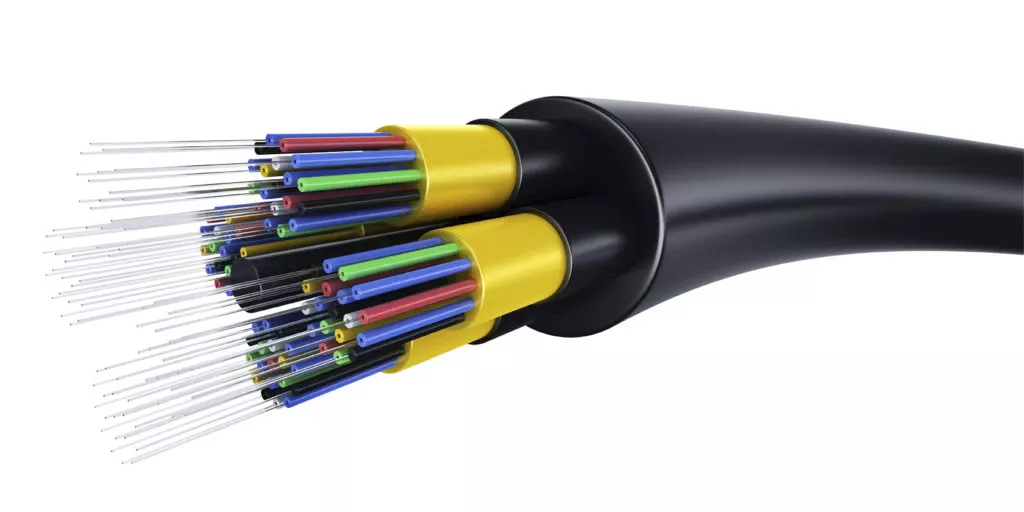
- General Product Name : Optical Fibre Cable
- Product Category : Telecommunication Equipments
- Compliance Name : TEC Certification
- Group : C
- Scheme : GCS
Optical Fibre cable is a high-speed data transmission medium composed of thin strands of glass or plastic Fibres. It is a fundamental technology for modern telecommunications and data networking, offering exceptional data transfer capabilities. Light pulses, typically in the form of laser or LED signals, travel through the optical Fibres, carrying digital data over long distances with minimal signal loss. Optical Fibre cables are known for their ability to transmit data at incredibly high speeds and over extended distances, making them a key component in internet backbones, long-distance communication networks, and high-speed broadband connections. The technology has revolutionized communication by enabling the rapid transfer of voice, data, and multimedia content. Optical Fibre cables offer numerous advantages, including immunity to electromagnetic interference, security due to their difficulty to tap or intercept, and higher bandwidth capacity compared to traditional copper cables. This technology is essential for the Internet, telecommunication networks, cable television, and a wide range of data-intensive applications that rely on fast, reliable, and high-capacity data transmission.
The standardized categories scheme, GCS, and the classification group C for Optical Fibre Cable are essential components of the telecommunications and data infrastructure industry. GCS offers a systematic framework for categorizing and organizing various equipment and components, ensuring consistency and clarity across the sector. Group C specifically addresses Optical Fibre Cable, a fundamental element in high-speed data transmission and telecommunications networks. By standardizing the categorization of optical Fibre cables within Group C, industry professionals can rely on consistent specifications and quality standards, ensuring that these critical components meet performance expectations. This standardization is crucial for the seamless functioning of modern communication networks, promoting reliability and compatibility while facilitating the expansion and maintenance of advanced telecommunications systems.
Note: Foreign manufacturers of Optical Fibre Cables are required to obtain the mandatory TEC Certification to export their products to the Indian market.
TEC Certification is a mandatory requirement for foreign manufacturers seeking to export Optical Fibre Cables to the Indian market. This certification process ensures that Optical Fibre Cables comply with the specific technical and safety standards established by Indian regulatory authorities, including the Department of Telecommunications. By necessitating TEC certification, India aims to guarantee that Optical Fibre Cables meet the nation's stringent standards, ensuring their reliability and performance when integrated into Indian telecommunication networks. TEC certification is essential to assure that Optical Fibre Cables function seamlessly within India, contributing to the country's robust and expanding telecommunications infrastructure while adhering to the required safety standards.
TEC Certification includes fourteen variants for Optical Fibre Cables, which are as follows:
- Hybrid Cable - Optical and Metallic
- Optical Fibre Cable - ADSS on Aerial alignment
- Optical Fibre Cable - ADSS over Power line
- Optical Fibre Cable - Direct Buried
- Optical Fibre Cable - DSA
- Optical Fibre Cable - Duct
- Optical Fibre Cable - In home
- Optical Fibre Cable - Indoor
- Optical Fibre Cable - Indoor/Outdoor
- Optical Fibre Cable - Lashed Aerial
- Optical Fibre Cable - Micro-Duct
- Optical Fibre Cable - Outdoor
- Optical Fibre Cable - Riser
- Optical Groung Wire - OPGW
TEC (Telecommunication Engineering Centre) Certification is a vital certification provided by the Telecommunication Engineering Centre, which operates under the Department of Telecommunications, Government of India. Established in 1991, TEC is responsible for setting standards and ensuring the quality and interoperability of telecommunications equipment and services in India. TEC Certification is a testament to a product's compliance with India's technical standards and legal requirements, facilitating foreign manufacturers' access to the Indian telecommunications market so that they can export their products in India. It helps verify the quality and safety of telecommunications equipment, fostering consumer trust and enhancing market competitiveness for manufacturers. TEC Certification plays a significant role in assuring that telecommunications equipment meets the standards and requirements necessary for its deployment and operation in India.
Complete your TEC Certification process by following these steps:
Step 1: Register on the TEC Portal
Step 2: Allocation of Testing Laboratory
Step 3: Submit Samples for Testing
For more detailed information, please click here.
Here is the list of documents required for foreign manufacturers for TEC Certification in India:
Legal Address Proof of the Manufacturing Unit:
- Provide a copy of the factory license, clearly indicating the product's manufacturing scope and the manufacturing unit's address in both English and the original language.
Trademark Details:
- Include a copy of the trademark (brand) registration.
- If the manufacturing unit is not the trademark owner, submit an authorization letter from the trademark owner.
For more detailed information, please click here.
Export Approval, powered by Brand Liaison, is a single platform solution for various product certifications and approvals in India. We are one of the leading compliance consultant that provide essential Indian certification services to manufacturers to export their products to India. Our services include:
- Comprehensive support for paperwork, testing, and guidance.
- Sample development meeting standards for complete conformity in testing labs.
- Detailed application preparation and timely query responses.
- Free license maintenance for 2 years.
Download Brochure
Process & Guidelines